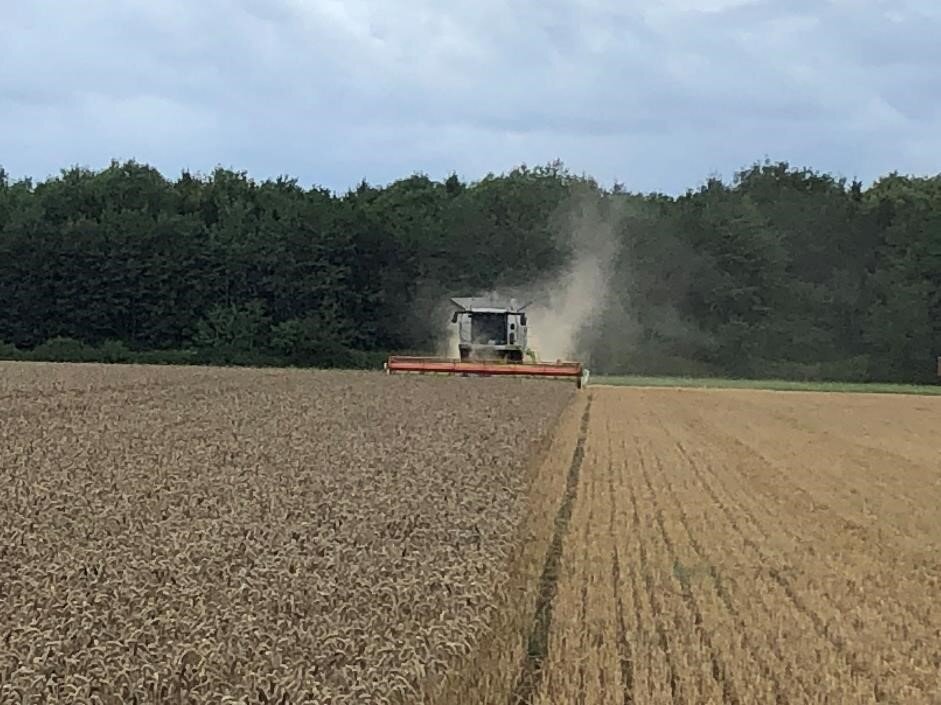In the two and a half years since Toby Hogsbjerg became Farm Manager for Wicken Farms at Castle Acre near Swaffham one of his key goals has been to reduce production costs and optimise the use of inputs to make the farming system as efficient as possible, both in terms of productivity and economic performance.
A cornerstone of that approach is to fully utilise the achievements of plant breeders in developing new varieties which help to reduce input requirements.
One of these is Theodore, DSV’s new Group 4 hard feed wheat which was added to the AHDB Recommended List in 2019 and underlined its class-leading disease resistance profile through its 2020 harvest results.
For the current season Wicken Farms have contracted 150 tonnes of Theodore for seed production and the remainder of the 60ha being grown will be sold for feed.
“With the reduction in the Basic Payment Scheme and prospect of lower incomes, we need to be able to grow crops for less, so reducing costs is a priority,” says Toby.
“Another issue facing the farming industry is the loss of chemistry and more restricted choice of products which is available to us.
“Given that backdrop, and with less new chemistry in the pipeline, our focus is very much on harnessing developments in plant breeding technology,”
BASIS qualified, Toby does most of the cereal agronomy at Wicken Farms himself, with input from an independent agronomist.
Farming approximately 900ha, all of which is within a ring fence and can be irrigated, the privately-owned business produces winter wheat and hybrid winter barley, he explains
“We don’t really have a set rotation because of all of the root crops which are produced here, both by ourselves and others.
“We are growing a significant area of irrigated crops, 200 acres of potatoes on, at most, a one year in eight rotation, and 200 acres which is let for producing onions and parsnips.
“We try to produce as much first wheat as possible, because a second cereal is not ideal on this light land.
“Growing winter wheat seed commercially works well for us because ground can be ploughed or min-tilled late after root crops, which reduced the incidence of disease and aphids, allowing clean seed crops to be produced.
“Being inland, we don’t have any major disease issues and compared with many other farms our spray programme would be considered fairly light.”
Reducing Fungicide Spend
Enabling spraying decisions to be further refined through fewer, more timely applications based on actual crop requirements rather than traditional timings is a key aim, Toby says.
“Another reason that we want to grow more cereal varieties with greater in-built disease resistance is to reduce the pressure on our 24m Sands self-propelled sprayer.
“We grow a significant area of potatoes and it goes through the crop every seven to 10 days, as well as applying liquid fertilisers, so we do not want the added pressure of unplanned fire-engine sprays to protect susceptible cereal varieties.
“DSV Theodore is a robust all-round variety with a good all-round disease package and did all that we wanted it to last season from a fungicide spend of just £70/ha.
“Because of the very wet autumn and winter in 2019/20 it was early February before we could get on the land to drill our first crop of Theodore, 20ha for seed.
“It was never going to be our highest-yielding crop but given the circumstances I was pleased with the outcome.”
This year, the majority of the variety was drilled in reasonable conditions following sugar beet on land that had been ploughed. The crop went in on 17 October using a combination drill and a ‘sensible’ seed rate of 180kg/ha to provide 350-360 seeds/m2.
“Theodore was drilled at the right time, came out of winter looking in good and by mid-March was looking promising,” Toby states.
“It had 100kgN/ha at the beginning of March and will probably receive another 100kgN/ha at the end of March or in early April depending on the season, so ‘fingers-crossed’ it will produce a good yield at harvest.”
HELPING GROWERS TO LOWER PRODUCTION COSTS
Theodore is a variety very much in tune with the times because of its in-built ability to cope with disease threats and potential to reduce agronomic inputs, says Sarah Hawthorne of DSV.
“It also provides growers with greater flexibility in terms of fungicide use when weather and other commitments prevent perfect timing of applications.
“Farmers are increasingly focusing on the overall economics of growing a variety and its resilience in the face of adverse conditions rather than just its outright yield potential.
“DSV Theodore provides hope that genetics will be able to replace the sprayer to a larger degree in the future.”
Wicken Farms in Norfolk was one of the first farming businesses to grow DSV Theodore, a new Group 4 hard wheat which with an 8.3 for Septoria resistance in the 2021/22 RL is now widely regarded as the UK’s ‘cleanest’ variety.
